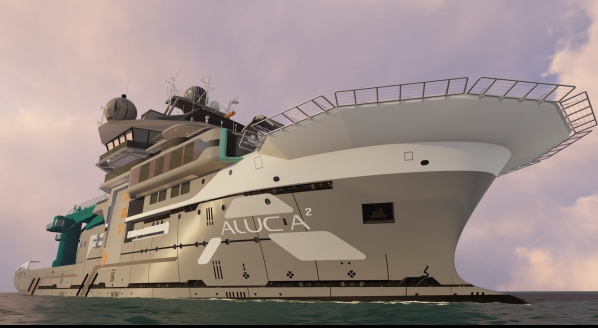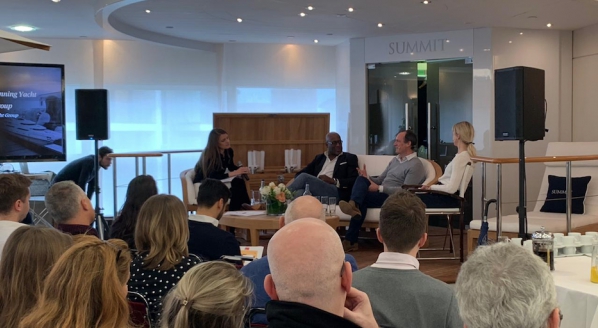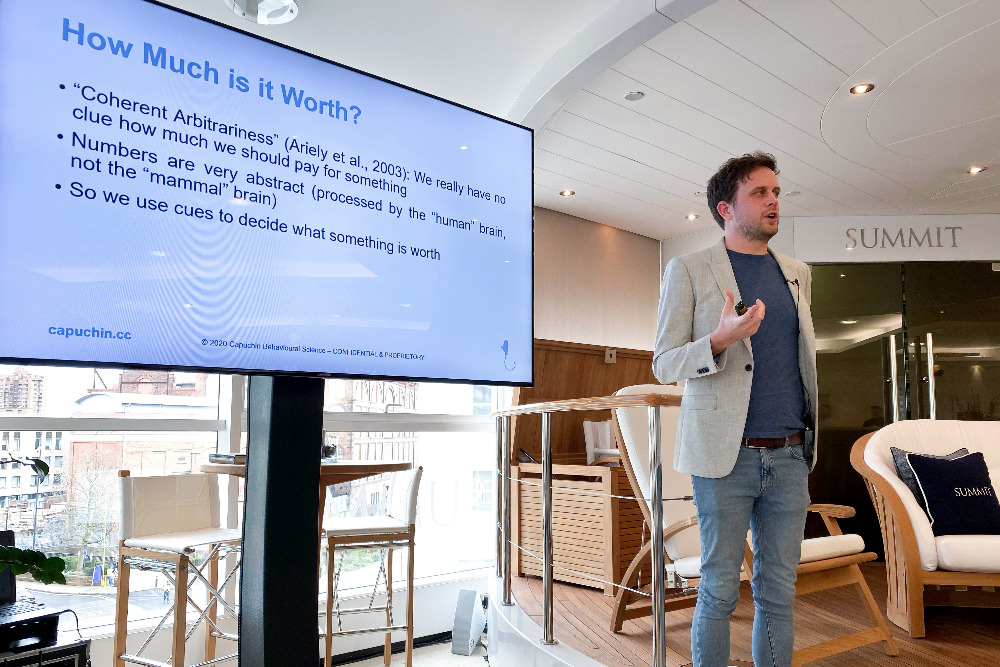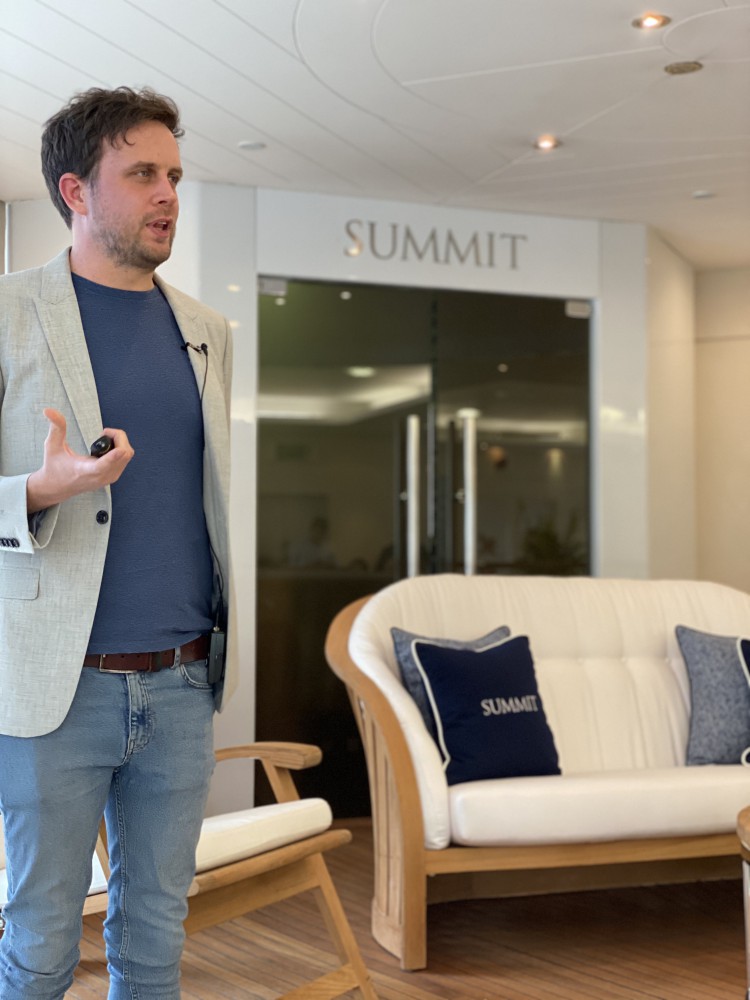Design with personality
Behavioural scientist, Patrick Fagan unlocks the secrets of the brain at The Superyacht Design Summit…
When it comes to design and aesthetics, there is a plethora of research and theory that can determine how our personality types can be affected by design. Through a combination of academic research and experimentation, psychologists and behavioural scientists have the tools to determine how certain personality types are affected by all kinds of aesthetical and psychological cues, which strongly link to the world of design.
As a precursor to the upcoming Superyacht Design Forum in May (12-14), and as part of London Design Week, The Superyacht Group welcomed behavioural scientist, Patrick Fagan to speak at The Superyacht Design Summit, held in partnership with Summit Furniture, to unlock the secrets of the brain and explain how we are provoked by a range of aesthetical and social cues.
Over his impressive career, Fagan has conducted a multitude of behavioural controlled-research studies to explore the psychological forces behind behaviour and how our minds respond to day-to-day activities, the majority of which is subconscious.
“Despite all of this amazing, sophisticated technology around us, we are still very much driven by emotion and subconscious forces,” Fagan began. “We are very much driven by innate emotional drives. As evolutionary psychologists like to say, ‘our modern skulls house a stone age brain’.”
Fagan moved to explore the concept of value, and how our brains tend to perceive it. “Value is an arbitrary concept; how do we decide what something is worth?” he queried. “We tend to rely on psychological cues which we process and react to subconsciously.” Through a series of examples, Fagan explained how there are many ways that our minds can be influenced by pricing techniques.
“There are a number of numerical cognition bases that can be used. One is having precise numbers rather than having lots of zeros. We tend to round numbers up, so if there are money zeros it can look like it must be a large number because it has been rounded up. And so research found that people perceived the value of a large price to be better if it is precise, even if that number is bigger than the one with all the zeros.
“Prices are, in fact, arbitrary; we don’t have any coherent judgement about what something is worth in absolute terms. Numbers are quite new in the evolutionary history and prices are even newer so it is not something that we deal with very well. So, we rely on psychological cues to determine how much something is worth.”
- Patrick Fagan
“Prices are, in fact, arbitrary; we don’t have any coherent judgement about what something is worth in absolute terms,” continued Fagan. “Numbers are quite new in the evolutionary history and prices are even newer so it is not something that we deal with very well. So, we rely on psychological cues to determine how much something is worth.”
When it comes to determining something’s worth, Fagan explained that our minds tend to rely on relative judgement rather than understanding it in absolute terms. “If I gave you a suitcase and asked you to tell me how much it weighed you wouldn’t be able to do that, but if I gave you two suitcases and said which one is heavier you could probably do that very easily. It is the same with prices, we make them very relatively, not in absolute terms.”
But of course, external and environmental cues can have an effect on pricing decisions, with Fagan referring to an experiment which involved people purchasing wine. “A study looked at music being played in wine shops, and found that if you played classical music, as opposed to pop music, people would spend more money on wine - they don’t buy more, but they do buy more expensive wine.”
Surprisingly, the human brain is extremely limited in the conscious sense, but we are actually processing a huge amount of information subconsciously and working out what to pay attention to. “Imagine your name is Bob, and you are at a noisy cocktail party, with music and lots of people talking and loads of conversations going on around you. You hear from across the room that someone says ‘I don’t really care for Bob’. You would hear that conversation, even though you weren’t actively listening. Your brain is processing all of those conversations at a very low level, and then when it hears something that it deems important, it directs all of your limited conscious resources to it.
“There is a region of areas in the brain that acts as a gatekeeper, which processes all of this information and decides what you should focus your limited resources on,” added Fagan. “It has a VIP list of things that you will instantly pay attention to, things like puppies.”
One of the things that our brains are incredibly good at, he explained, is first impressions. So much so that just one tenth of a second looking at a photo of someone’s face can provide you with a huge amount of information about that person, at a rate of 75 per cent accuracy.
“Personality can be inferred by immediate cues, like someone’s bedroom, or what they are wearing, body language, their interests and preferences,” said Fagan. “You can use immediate cues to underline dispositions, which tend to be neurobiological. For example, extroverts are more sensitive to reward, so that makes them happier, it makes them more sensation-thinking, it makes then want to go about and do things more.”
You can use immediate cues to underline dispositions, which tend to be neurobiological. For example, extroverts are more sensitive to reward, so that makes them happier, it makes them more sensation-thinking, it makes then want to go about and do things more.”
- Patrick Fagan
Fagan explains that when you can infer this disposition from immediate cues you can then predict things that are more long term and out of context including what kind of job someone would have to what kind of design and aesthetics they like.
“If someone is open to experience, that means they are like aesthetics which are artistic, modern, surreal and unconventional. They are more likely to like abstract art, rather than representational art and they like it to be intellectually stimulating. But, if someone is conscientious, they like conventional and unstimulating music - country music - they also like representational art - portraits, landscapes - and to do what it says on the tin - structure and order.
“Extroverts like things to be emotionally arousing, so exciting and stimulating,” added Fagan. “They like happy and positive in tone with warm and bright colours. They like social scenes, pictures of people. Whereas, agreeable people like it to be gentle - nothing morbid, no Damien Hurst; they like it to be really nice, warm colours and curved aesthetics and shapes. They don’t like sharp angles. They like things to be harmonious with nothing abrupt or striking.
Through a multitude of personality cues, Fagan explained that we have the tools to accurately determine what kind of design and aesthetics clients desire. This fascinating exploration of our minds, means that there are clear and concise ways that we can understand the forces behind our behaviour, to the extent where we can determine intricate preferences.
Fagan’s fascinating approach is an example of the subject matters that are to be explored at The Superyacht Design Forum from 12-14th May. We have conducted research into the most stimulating, useful and engaging topics designed to match the new heights set out by Fagan in this discussion. To find out more and to register for The Superyacht Design Forum 2020 click here.
Profile links
Summit Furniture (Europe) Ltd.
NEW: Sign up for SuperyachtNewsweek!
Get the latest weekly news, in-depth reports, intelligence, and strategic insights, delivered directly from The Superyacht Group's editors and market analysts.
Stay at the forefront of the superyacht industry with SuperyachtNewsweek
Click here to become part of The Superyacht Group community, and join us in our mission to make this industry accessible to all, and prosperous for the long-term. We are offering access to the superyacht industry’s most comprehensive and longstanding archive of business-critical information, as well as a comprehensive, real-time superyacht fleet database, for just £10 per month, because we are One Industry with One Mission. Sign up here.
Related news
.jpg)
Countdown to Riviera Yacht Support Snow Bonanza 2020
Registrations are open for the 11th edition of the event, taking place on 20 March
Crew

Land of hope and glory
We delve into the outstanding facets of the British superyacht market and highlight the activity that keeps it alive
Fleet

A momentous occasion for ocean discovery
'OceanXplorer' entered the water at the Damen facilities after a mammoth conversion from oil-survey and supply vessel
Owner

Behavioural science and its place within superyacht design
The Superyacht Design Forum countdown begins
Design
Related news
Land of hope and glory
6 years ago
A momentous occasion for ocean discovery
6 years ago
NEW: Sign up for
SuperyachtNewsweek!
Get the latest weekly news, in-depth reports, intelligence, and strategic insights, delivered directly from The Superyacht Group's editors and market analysts.
Stay at the forefront of the superyacht industry with SuperyachtNewsweek





